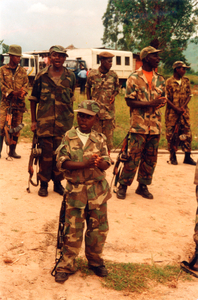
By Angela T. Chang, Advocate, Crisis Prevention and Response Team, Amnesty International USA
When a little boy is kidnapped, turned into a child soldier, forced to kill or be killed — that’s slavery. When a little girl is sold by her impoverished family—girls my daughters’ age—runs away from home, or is lured by the false promises of a better life, and then imprisoned in a brothel and tortured if she resists — that’s slavery. It is barbaric, and it is evil, and it has no place in a civilized world.
— US President Barack Obama, September 2012
Despite these strong words by President Obama against the use and recruitment of child soldiers a few months ago, he got reprimanded earlier this week for falling flat in delivering on tangible actions to address this issue.
The UN Committee on the Rights of the Child released a new report on Tuesday, calling out the U.S. and the Obama administration for failing to adhere to its international human rights obligations by continuing to waive sanctions on military assistance, per the 2008 Child Soldiers Prevention Act, to countries that are known to recruit and use child soldiers – a clear violation of children’s rights and a war crime if the children are under the age of fifteen. Yes, you read that right. Seems confusing and backwards? That’s because it is.
Tuesday’s UN report urged the United States to,
“enact and apply a full prohibition of arms exports, including small arms and light weapons as well as any kind of military assistance to countries where children are known to be, or may potentially be, recruited or used in armed conflict and/or hostilities. To this end, the [United States] is encouraged to review and amend the 2008 Child Soldiers Prevention Act with the view to withdrawing the possibility to allow for presidential waivers to these countries.”
South Sudan, Yemen and the DRC (in part), are countries that have repeatedly received these sanctions waivers – year after year – despite administration promises that this would “not become a recurring event.” The presidential moratorium this past September saw Libya join the list of countries receiving waivers, while Chad has completely been taken off the list of countries subject to military sanction. The U.S. thus continues to use national security arguments to selectively and consciously provide unconscionable military assistance and support to governments who use innocent children in conflict.
Amnesty International has long documented the use of child soldiers by armed groups in countries such as the DRC, Chad, Sri Lanka, Uganda, Somalia, Yemen, Sudan and South Sudan. Most recently, the armed conflict in Mali was accompanied by a marked increase in reports of the recruitment and use of children, by both sides. And as if that weren’t enough, the situations in the DRC, Sudan, and Uganda have served as the backdrop for conflicts that have given rise to alleged perpetrators of mass atrocities that are wanted for indictment by the ICC for war crimes, crimes against humanity and genocide, including but definitely not limited to the recruitment and use of child soldiers.
The need for a global Arms Trade Treaty
The UN’s recommendation goes hand-in-hand with Amnesty’s call on the President to demonstrate leadership by establishing a strong and comprehensive global Arms Trade Treaty that will stop irresponsible arms transfers around the world that directly fuel serious human rights abuses including the recruitment and use of child soldiers.
As my colleague concludes in an earlier post – withholding portions of military aid is not a magic cure-all – and I would add that neither should a global ATT be viewed as such. Ensuring the rights of children, including protecting them from being recruited and used as child soldiers, requires a comprehensive approach and a true commitment by governments and armed groups, to respect the rights of children. By upholding the true nature of the 2008 Child Soldiers Prevention Act – which was NOT intended to by riddled by waivers – and by demonstrating U.S. leadership in the ratification of a global Arms Trade Treaty, President Obama can follow through on his rhetoric and lead the U.S. in doing OUR part to protect the most basic rights of children.
